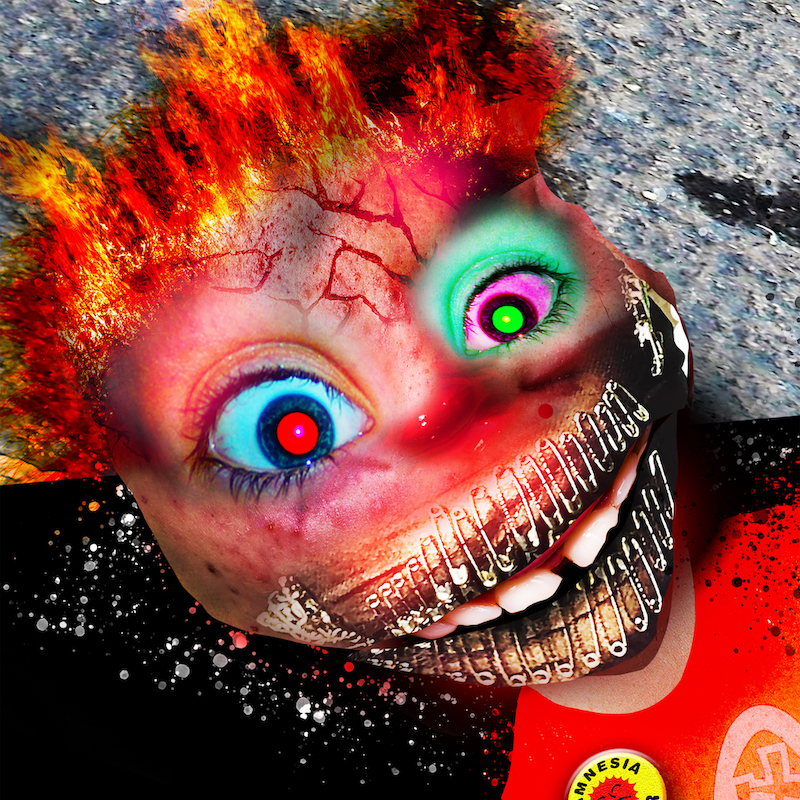Once upon a time, they were called Renaissance Man. About a decade ago, Ville Haimala and Martti Kalliala, two architects working at the same firm in Helsinki, designed a nightclub together. They bonded over a shared affinity for electronic music and began making music to fill spaces like that nightclub: playful yet straightforward techno. They moved to Berlin, got bored with the club sound, and started making songs that were weirder and darker and more experimental. They ran the phrase "Renaissance Man" through an anagram finder and emerged with a new alias: "Amnesia Scanner."
What is an amnesia scanner, exactly? Who the hell knows. But the process of taking something recognizable and scrambling it into a strange new shape that doesn't quite make sense but still sounds like it means something is central to the duo's identity and to the music they make. Like fellow internet-age experimentalists Holly Herndon, Oneohtrix Point Never, or even 100 gecs, Haimala and Kalliala take the forms and conventions of disparate genres -- EDM, metal, noise, ambient, industrial, emo, pop -- and shake them all together, add digital detritus to taste, and present the resulting cocktail as something approaching a twisted new kind of pop music for the future.
Except it's not the sound of the future -- it's the sound of right now. "It's our interpretation of the present, and for it to feel like now, it needs to be exaggerated, cartoonish, and scary -- as well as dumb and funny at times," Kalliala once said in an interview. "The contemporary experience is schizophrenic and contradictory. This anxiety or abstract horror that comes about from the political times and climate change we’re living through -- every day there's a crisis. But at the same time, there is this narrative being fed to us through Silicon Valley, that we would be delivered through incredible technologies around the corner that will somehow lift us up from misery. This kind of dark euphoria is a new emotion that is really present here."
That interview took place in 2018, just before the release of Amnesia Scanner's debut album Another Life. Things have only gotten more cartoonish and scary and schizophrenic and contradictory since then. Haimala and Kalliala's home country of Finland keeps thawing as climate crisis continues to tighten its grip on the planet, and the creeping specter of fascism continues to spread its spidery tendrils throughout the world. The duo have described their new album Tearless as "a breakup album with the planet" -- and that was before the global pandemic was a thing and cities began to erupt in the wake of horrifying police violence in America.
If these really are the end times, Amnesia Scanner have given us a fitting soundtrack. Tearless is suffused with a prickly sense of impending doom. Songs morph into unpredictable new forms in real time, with distorted synths bouncing against blown-out beats and setting off ricocheting chain reactions. "AS Flat," a collaboration with Pittsburgh metalcore warriors Code Orange, progresses through several different tempos in its three-minute runtime, tied together by its oppressively downcast mood and plodding riffs. The gothic, expansive "AS Labyrinth" suddenly lunges into a pummeling rhythm midway through before dissolving into airy abstraction.
And yet this atmosphere of dread is fused to moments of genuine beauty, like the glimmering synthetic melody that closes out "AS Enter" or the computerized symphonic dirge "AS Trouble." Even more than 2018's relatively accessible Another Life, this expressionist cyber-Frankenstein music somehow still scans as pop, Trojan-horsing a manic freakout about the state of the world into songs that get stuck in your head even as they shapeshift too frequently to let you get your bearings. "AS Too Late" is a straight-up banger, with its insistently strobing dance synths lasering their way into your brain. "AS Tearless" and "AS Going," collaborations with Peruvian singer and model Lalita and Brazilian DJ/producer LYZZA, are both structured around extremely earwormy vocal loops and reflect the influence of reggaeton and Latin music on the contemporary pop landscape. They sound something like a radio dial turned halfway between a Top 40 channel and hell.
The most prominent voice heard on Tearless, however, is Amnesia Scanner's unofficial third member: "a disembodied voice called Oracle, which represents the sentience that has emerged from Amnesia Scanner," per a press release. First introduced on 2018's Another Life and even more omnipresent on Tearless, Oracle is a vocoder-like production tool that renders genuine emotion as half-abstracted digitized wails. So Tearless is a pop album sung mostly by a robot, a treatise on the human condition mediated by a software plugin. And even when more recognizably human voices like Lalita and LYZZA appear, they can be processed to within an inch of their lives, too, collapsing the distinction between man and machine entirely.
Tearless revels in these contradictions. It is most definitely not for everyone. But it's also a surprisingly effective good-faith attempt at externalizing all of the chaos and confusion of our age -- from modernity's endless tangle of cells and wires to mankind's ill-advised game of chicken with extinction -- into a coherent musical aesthetic. And somehow, this dystopian nightmare-scape ends up in a place approximating a calm acceptance. Yes, everything is fucked. That's just how it is. Maybe that's OK? "You will be fine, if we can help you lose your mind," Oracle sings on Tearless' hymn-like closer "AS You Will Be Fine." Maybe losing your mind is the only sane response to a world gone mad. Amnesia Scanner's Tearless will help you get there.
Tearless is out tomorrow, 6/19, on PAN. Pre-order it here.






